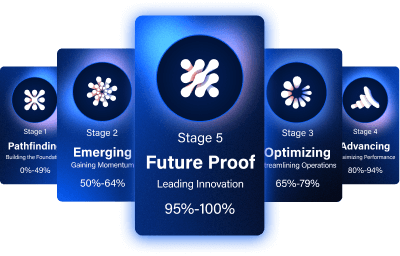What makes an accounting firm valuable? Is it its size, location, profitability, composition of client base, or perhaps its mix of cloud-based solutions and technology?
While all of those aspects are key considerations, the most important is its use of modern technology.
In this post, I’ll explain:
- Why accounting firms using outdated processes limit their M&A (merger and acquisition) readiness.
- The key technologies to use to make your firm more efficient, profitable and valuable.
Download: Free M&A Technology Guide
‘Merger Mania’ and the Most Valuable Firms
“Merger mania” (the increase in the number of firms merging with one another) has surged since the pandemic. The most valuable firms are getting cherry-picked and earning higher multipliers for their owners.
While size, location, profitability and composition of client base are key considerations, the use of modern information technology is a significant differentiator when comparing and valuing firms for two reasons:
- Outdated technology and processes require significantly more investment in training and equipment post-acquisition to get up to speed.
- Forcing massive change on staff creates significant stress and results in much lower staff retention. (Directly countering one of today’s main reasons for acquiring a practice.)
Adopting modern firm technology and processes makes your firm more efficient and profitable. It also makes it more attractive and valuable when considering a merger or when planning to be acquired.
Below we outline six key technology indicators of a modern practice that make it more valuable.
Download: Free M&A Technology Guide
How to Increase Your Firm’s Value With Technology
1. Go Paperless
Working with paper documents costs more in terms of dollars and staff production time than working with digital files.

Digitalization requires firms to educate clients on providing required documents securely in a digital format through client-friendly portals or secure email.
When physical documents are received, the firm must follow a standard process:
- Digitally scan the file.
- Organize the file(s).
- Make the data available to authorized users.
- Share its location (for preparation and review).
- Shred the physical document.
Steps should be done efficiently and shouldn’t require professional staff input.
Obviously, it’d be much easier to circumvent the above steps and go with a truly digital process using a cloud-based document management system and digital workflow tool.
That way:
- The status of every project is transparent to all parties.
- Files stay organized.
- Files are automatically backed up.
- Files are secure.
Download: Free M&A Technology Guide
2. Invest in a Remote Access Platform
The pandemic made reliable and secure remote access a necessity overnight.
Maybe you—like many other professionals—cobbled together a remote desktop solution using your own network. And maybe you found it unreliable and unsecured, which prompted you to return to the office as soon as possible.
You may have even found an interim solution. And you personally may be fine with working back in the office, but your staff and clients aren’t.
To make yourself “modern” and more attractive to merger and acquisition prospects, you need to:
- Standardize on a remote access platform across your firm.
- Access both workflow and document management tools from that platform.
- Ensure all firm personnel and clients have access to it.
Not only will this prepare you for an M&A, but using a remote access platform makes collaboration between personnel and clients possible anytime, anywhere.
If you do choose to go the remote access platform route—and you should—don’t skimp on the equipment. Professional-level usage of video, audio and data-sharing software requires enterprise-class tools.
Even using basic collaboration tools like Microsoft Teams and Zoom will automatically make your firm more valuable. Why? Because they allow for more timely responses and reduce travel time, saving you money, day after day.
Download: Free M&A Technology Guide
3. Cloud-Enable Your Infrastructure
Accounting firms are among the most complex businesses because of the wide variety of services, applications and ongoing maintenance required of their data infrastructure.
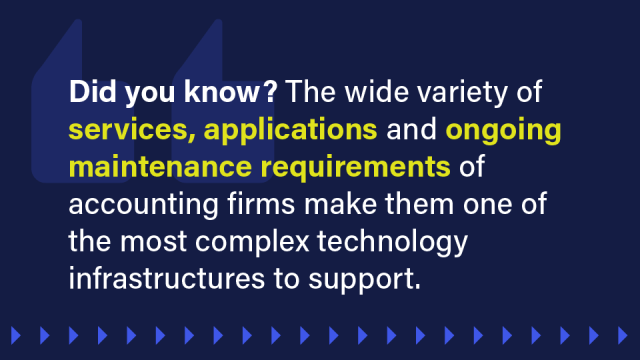
Most accounting firms use close to 100 applications. Building and maintaining that unique infrastructure requires a deep understanding of security and technology. It’s a skill that most accounting firms simply don’t have the personnel or resources for.
Moving to a cloud provider whose sole focus is on securing and supporting your accounting and tax tech stack helps in many ways:
- The responsibility of maintaining an IT infrastructure is immediately offloaded, allowing you to focus on servicing clients and running your practice.
- The time you get back to focus on strategy makes a fruitful merger and acquisition more possible.
- Growth-minded firms, and even those happy to remain small shops, benefit greatly from fewer distractions.
- Your IT infrastructure is significantly more secure (and more valuable because of its security).
The cloud also makes firms more valuable, as their IT infrastructure is significantly more secure.
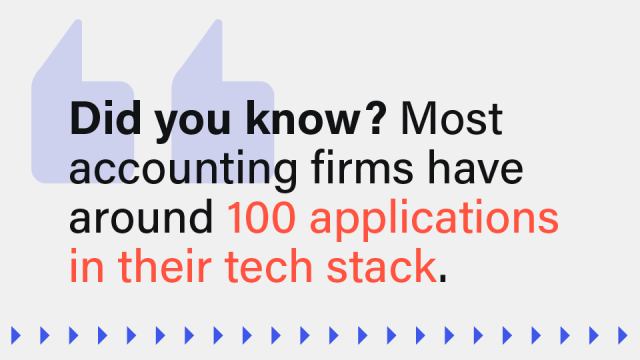
Download: Free M&A Technology Guide
4. Use Accounting-Specific Security
Speaking of security, accounting-specific security providers are more prepared to handle cybersecurity threats compared to most internal teams or even local IT providers.
Accounting-focused cloud providers have:
- Enterprise-class security teams.
- Enterprise-class tools and disaster avoidance and recovery capabilities.
“Enterprise-class” means that any tool used to protect your accounting firm is the same that big banks and large corporations use to protect their businesses. Typically, these tools are unaffordable to most small accounting firms and sole practitioners. But when sourced through a company like Rightworks, they remain within budget.
Additionally, seek out a comprehensive security and phishing training provider. Security awareness training further reduces your risk of a breach, making you more attractive to an acquiring or partnering firm.
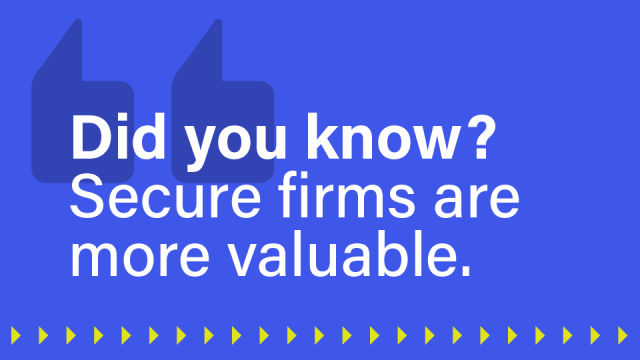
5. Standardize Your Tech Stack
Your tech stack, or collection of tools, apps and software you use at work, must be standard across your entire firm.
Not only will this streamline operations with colleagues, but it’ll boost your production efficiency for clients as well.
Strive to:
- Minimize the number of redundant applications you use to support clients.
- Thoroughly document process efficiency so there becomes “one firm way” of producing work.
- Have a standard client accounting and advisory services (CAAS) tech stack.
- Integrate data via APIs, machine learning and robotic process automation (RPA) across your CAAS tech stack.
A standard firm tech stack allows new hires and contractors to get up to speed quickly. It also makes everyone better and more suited to supporting each other. One that uses RPA, APIs, machine learning, etc., highlights your firm’s technology acumen, making it that much more valuable.
Download: Free M&A Technology Guide
6. Always Be Innovating
Firms operating 100% digitally in the cloud using the latest tech stack apps are more productive and valuable. But how did they get there?
The answer: They have an innovation mindset.
To have an innovation mindset, you must:
- Evaluate the way your firm works today and identify the obstacles keeping it from moving forward.
- Be willing to learn how accounting processes can work better; then pursue solutions that allow you to do so.
This process isn’t “set it and forget it.” Having a culture of innovation requires keeping up with the latest trends and ongoing adaptation of processes.
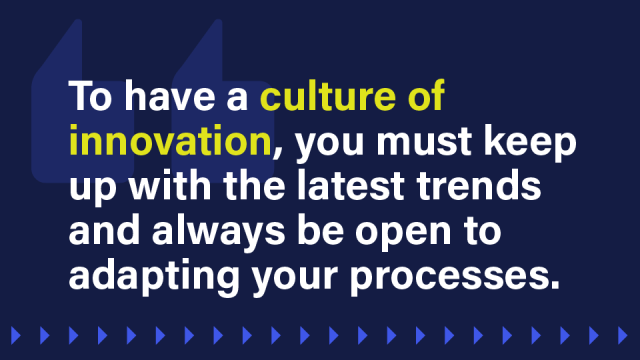
For example, the latest trend (AI) has created significant shifts in firm operations. Generative AI tools like SPARK create significant process improvements for accountants. Unfortunately, if you’re not using an AI tool yet, you risk falling even further behind.
It’s not too late for innovation. Firm owners and leaders who proactively invest time and financial resources in this area will see they can positively reverse that trend.
Download: Free M&A Technology Guide
Disrupt the Status Quo
Simply ignoring change has worked for some in the past. But with the rate of innovation and technological change accelerating daily, maintaining the status quo will only make your firm’s value atrophy faster.
The better business option:
- Adopt an innovation mindset.
- Modernize your firm’s technologies (security, cloud, digital tools).
- Proactively implement standard tech stacks.
These steps will make your firm more valuable every day.
For more information on M&A and accounting technology best practices, subscribe to our blog.
